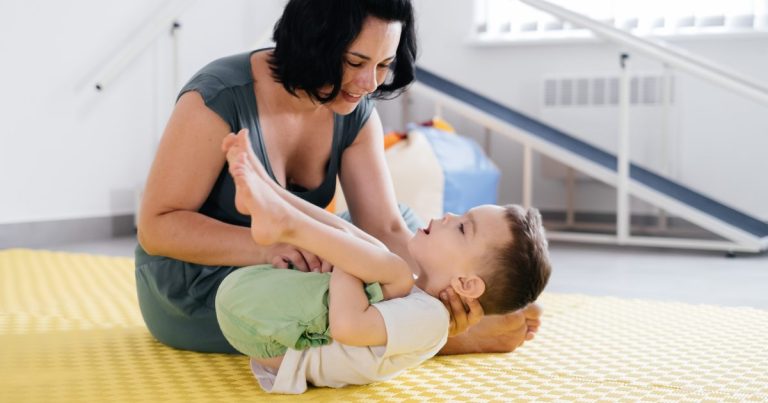It’s really important for your child to develop their sitting balance in safe positions with support from you. Giving your baby lots of time in a variety of positions such as tummy time and side-lying and not placing them for long periods in supportive equipment such as baby seats or high chairs will allow them to naturally develop their sitting skills.
Below are our top tips for sitting development:
When your baby is young practise holding them in an upright position. When they are small they will need more support higher up their chest as they get stronger you can lower your support to their lower trunk or hips.
Start by sitting them in reclined positions, this reduces the stress on the muscles as they do not have to work as hard against gravity. It also helps your child to learn about the world in an upright position. Padding out a corner of a box, washing basket or their bassinet is a good way to practice reclined supportive sitting.
You can place them in sitting with their legs open wide, this gives them a bigger base of support. Put your hands on their chest or hips. Babies start off with a rounded spine position in sitting until they are strong enough to push themselves up into an upright position and they will prop with their arms in front to give themselves more support. You can encourage them to sit with their back straight by placing motivating toys/activities higher up but you will need to give them more support at their chest.
Always practice sitting on soft surfaces such as a floor mat and you can place cushions around them so if they fall (which they will) they have a soft landing.
When your baby is more confident sitting and can sit with their back straight all by themselves, start to challenge them by placing motivating objects just out of their reach so they have to lean to get them, further developing their sitting balance.
Give your baby plenty of time out of sitting in positions such as tummy time and side-lying. When your baby starts to show signs of fatigue sitting e.g. leaning forward onto their arms constantly, dropping their head down, or falling frequently it’s time to give them a rest.
Remember sitting is a hard skill for your baby to master as they have to work their muscles hard to sit up against gravity. When they first start sitting they will need your support, so simple activities such as sensory play work best.
Babies start to develop independent sitting by six to nine months. If your baby is not sitting by themselves by nine months or you’re concerned about their control and position in sitting, speak to one of our paediatric physiotherapists today.






